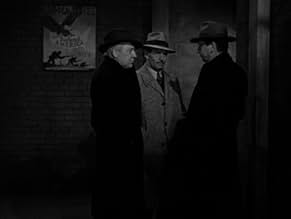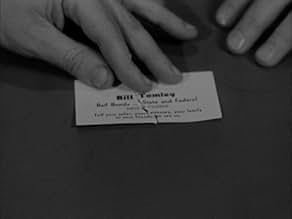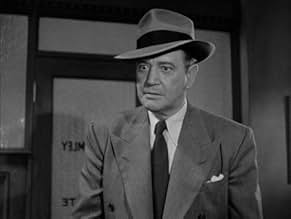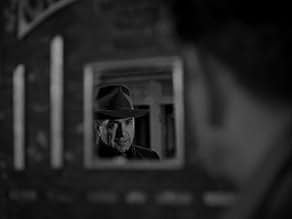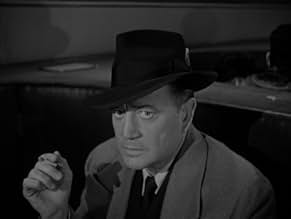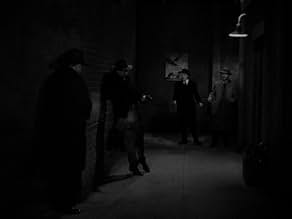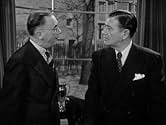VALUTAZIONE IMDb
6,3/10
1349
LA TUA VALUTAZIONE
Un uomo depresso assume un assassino per ucciderlo quando meno se lo aspetta, ma quando la sua vita prende una svolta verso l'alto, scopre che ora desidera vivere.Un uomo depresso assume un assassino per ucciderlo quando meno se lo aspetta, ma quando la sua vita prende una svolta verso l'alto, scopre che ora desidera vivere.Un uomo depresso assume un assassino per ucciderlo quando meno se lo aspetta, ma quando la sua vita prende una svolta verso l'alto, scopre che ora desidera vivere.
- Regia
- Sceneggiatura
- Star
Trevor Bardette
- The Bum in the Next Bed
- (non citato nei titoli originali)
William 'Billy' Benedict
- The Deafmute
- (non citato nei titoli originali)
Willie Bloom
- Bum
- (non citato nei titoli originali)
Roy Brent
- Detective in Alley
- (non citato nei titoli originali)
Charles Coleman
- Jennings the Butler
- (non citato nei titoli originali)
Clancy Cooper
- Telephone Repairman
- (non citato nei titoli originali)
Don Costello
- Lefty Vigran aka Gorss
- (non citato nei titoli originali)
Russell Custer
- Bar Patron
- (non citato nei titoli originali)
Ralph Dunn
- Cop at Car Accident
- (non citato nei titoli originali)
Otto Forrest
- The Whistler
- (non citato nei titoli originali)
Byron Foulger
- Flophouse Desk Clerk
- (non citato nei titoli originali)
John George
- Bum
- (non citato nei titoli originali)
Dick Gordon
- Tomley's Assistant
- (non citato nei titoli originali)
Robert Homans
- Dock Watchman
- (non citato nei titoli originali)
Recensioni in evidenza
I watched this last night on TCM and found it not only thoroughly entertaining but a textbook example of how a B-grade picture from a poverty row studio could rise above its budget limitations thanks to the efforts of a clever director (William Castle) and strong players (Richard Dix and J. Carroll Naish in particular). Superior in some respects to entries in parallel series based on radio programs (like Universal's Inner Sanctum with Lon Chaney, Jr.), perhaps the most appealing aspect of "The Whistler" is the economy with which the story is told. There are no needless lines, no needless scenes. Whether it belongs within the "noir" cycle is a matter to be debated, but nevertheless "The Whistler" has its share of the quirky characters and shadowy settings that typify that genre, not to mention the creepy portrayal by Naish of a hit-man who reads a monograph on "necrophobia" in his spare time.
Fans of the radio series will not be dissapointed by this little gem of a thriller. Richard Dix gives a great performance as a man who puts a contract out on his own life. He is upset because he has not gotten over his wife drowning in the Pacific Ocean on a vacation three years ago. He then gets a wire saying his wife is alive, will be home soon, and now has to hurry and stop the contract. The only thing this was missing that was common in the radio play was a suprise ending. Very often in the radio series, it was never a question of whodunit, as it was often told through the killer's point of view, but it was how they were going to trip themselves up or get caught. And it was always with a twist.
This movie is the first installment of The Whistler series from Columbia Pictures, all but one of which starred Richard Dix whose A-picture career was then on an alcoholic downgrade, but whose liquor-ravaged face was just right for the overall atmosphere. (For a complete list of series titles, consult "movie connections" on web page.) Of all the movie series to emerge from the 30's and 40's, this is easily one of the most fascinating and unusual. Each entry presents a different self-contained story, tied together only by the mysterious figure of The Whistler who comments briefly on plot developments, but appears only in shadow to whistle his trademark refrain. He seems to be a figure of fate since the hand of destiny emerges in most of the entries. But most importantly, the plots follow no formula (unusual for any series) and are entirely unpredictable in their outcome. This unpredictability is what distinguishes the series from others of the time.You really don't know what's going to happen or how each episode will turn out. Moreover, there's a strong noirish quality to many of the entries, with a suspenseful atmosphere, an underlying sense of doom, and imaginative characters and plot twists. All in all, the productions are a first cousin to the celebrated Val Lewton horror cycle from RKO, minus the supernatural. I'm surprised that with all the scholarly interest in film noir, that this noirish series has not received the critical attention it merits.
Though weaker in many ways (the script appears put together on the fly), this initial entry contains many features generic to the others. Dix, a prosperous manufacturer, arranges for his own death following the presumed death of his beloved wife, only to find out ironically that she is not dead. The problem is he can't undo the arrangement and is thus forced to escape through the labyrinthine venues of the city's skid row. The entire 60 minutes has something of a nightmarish quality since it starts off with Dix expecting death, though in what form, he can't be sure. Looking convincingly like a real bum, it's Dix's tour through the seedy parts of the city that really commands attention, especially the 25-cent flop-house with its rows of coffin-like cots, snoring vagrants, and sneak thief. You can almost smell the rot-gut whiskey peeling off the walls. The sets are bare-bones, the cafes, bars, and city sidewalks sometimes suggesting the unadorned depths of urban despair. Unfortunately, the ending is abrupt and disappointing. It's almost as though the production suddenly ran out of film and had to wrap it up right then. Nonetheless, many of the distinctive elements of the productions are already present. Unfortunately copies of the series are hard to obtain ( my own burned in a house fire some time ago). So let's hope our friends on cable TV follow up on this initial entry some time soon. It's well worth tuning in.
Though weaker in many ways (the script appears put together on the fly), this initial entry contains many features generic to the others. Dix, a prosperous manufacturer, arranges for his own death following the presumed death of his beloved wife, only to find out ironically that she is not dead. The problem is he can't undo the arrangement and is thus forced to escape through the labyrinthine venues of the city's skid row. The entire 60 minutes has something of a nightmarish quality since it starts off with Dix expecting death, though in what form, he can't be sure. Looking convincingly like a real bum, it's Dix's tour through the seedy parts of the city that really commands attention, especially the 25-cent flop-house with its rows of coffin-like cots, snoring vagrants, and sneak thief. You can almost smell the rot-gut whiskey peeling off the walls. The sets are bare-bones, the cafes, bars, and city sidewalks sometimes suggesting the unadorned depths of urban despair. Unfortunately, the ending is abrupt and disappointing. It's almost as though the production suddenly ran out of film and had to wrap it up right then. Nonetheless, many of the distinctive elements of the productions are already present. Unfortunately copies of the series are hard to obtain ( my own burned in a house fire some time ago). So let's hope our friends on cable TV follow up on this initial entry some time soon. It's well worth tuning in.
The "Whistler" was very odd for a B-movie series and so much unlike its contemporaries (such as Charlie Chan or The Falcon). Richard Dix starred in 8 of the 9 films. though he played a totally different character in each--sometimes a good guy and other times a bad one. In many ways, this is reminiscent of Universal's INNER SANCTUM series in that the same actor often played different roles in each film AND the series was NOT the standard detective film but an anthology series--much like TV's TWILIGHT ZONE. The "Whistler" in the titles of most of the films is an unseen guy in the shadows that narrates the film and occasionally makes comments during the film. This format was apparently created for the radio version of "The Whistler".
In this first of the series, Dix plays a depressed man who, instead of suicide, pays an unknown assassin to kill him!! While the whole idea is ridiculous and contrived, it is pretty entertaining--especially when Dix changes his mind and truly wants to live but he isn't sure who is coming to kill him or how to stop the contract! The biggest negative, other than the silliness of the story, was the narration by The Whistler. This narrator talks too much--sometimes making comments or saying things that were obvious to the viewer. I haven't seen the rest of the series, but surely hope this was corrected.
In this first of the series, Dix plays a depressed man who, instead of suicide, pays an unknown assassin to kill him!! While the whole idea is ridiculous and contrived, it is pretty entertaining--especially when Dix changes his mind and truly wants to live but he isn't sure who is coming to kill him or how to stop the contract! The biggest negative, other than the silliness of the story, was the narration by The Whistler. This narrator talks too much--sometimes making comments or saying things that were obvious to the viewer. I haven't seen the rest of the series, but surely hope this was corrected.
Before he became a producer and conjured up all those publicity gimmicks for his cheesy horror pictures, William Castle churned out a series of nifty little pictures as a director for Harry Cohn's B unit -- including the immortal "When Strangers Marry". "The Whistler" is a clever noir that tackles the old premise of a despondent man hiring a contract killer to murder him, only to change his mind later. Castle provides a higher standard of mise-en-scene than in most pictures of this ilk, with nice camera movement and grungy, realistic sets. The absurd plot twists and lapses of logic stretch credulity to the utmost -- but that's one of the "beatitudes of the B's" (as Andrew Sarris would say). It's surprising that Cornell Woolrich was not the original author, so close is the atmosphere to his oeuvre. Dix is a bit of a cipher, but Naish is as compelling as always in another offbeat role as the philosophical hit man who suffers from fear of death; plus there are plenty of familiar faces in minor roles. The mysterious omniscient Whistler narrator is effective, if somewhat underused here. Castle went on to direct two even better entries in the series.
Lo sapevi?
- QuizFirst of eight entries in the "Whistler" series, released from 1944 to 1948, and Richard Dix appeared in all but the last one. Unusually, he played a different character in each.
- BlooperWhile the killer is lying on the bed perusing his book on Fear of Death, a cigarette suddenly appears in his mouth.
- Citazioni
The Bum in the Next Bed: Rats in this place as big as beavers. They won't hurt ya... but you're liable to trip over them in the dark.
- ConnessioniFeatured in Spine Tingler! The William Castle Story (2007)
I più visti
Accedi per valutare e creare un elenco di titoli salvati per ottenere consigli personalizzati
Dettagli
- Data di uscita
- Paese di origine
- Lingua
- Celebre anche come
- The Whistler
- Luoghi delle riprese
- Azienda produttrice
- Vedi altri crediti dell’azienda su IMDbPro
- Tempo di esecuzione
- 59min
- Colore
- Proporzioni
- 1.37 : 1
Contribuisci a questa pagina
Suggerisci una modifica o aggiungi i contenuti mancanti

